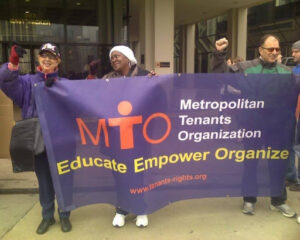 HUD tenants recently had concerns about bed bugs, issues with re-certification, retaliation by management, and the use of their community room in their building. Management at first did nothing to resolve the complaints. Tenants called MTO and building organizer David Wilson went to the building and informed them of their rights. Tenants in the Park Shore East building located at 6250 S. Harper then formed an association.
HUD tenants recently had concerns about bed bugs, issues with re-certification, retaliation by management, and the use of their community room in their building. Management at first did nothing to resolve the complaints. Tenants called MTO and building organizer David Wilson went to the building and informed them of their rights. Tenants in the Park Shore East building located at 6250 S. Harper then formed an association.
Tenants know that while committed individuals can make change, collective efforts are far stronger than the actions of individuals. The tenants association requested a meeting with management. Building management told the tenants they heard their issues and that they would be taken into consideration. At the next tenants’ association meeting, the leadership announced that the management brought in specially trained dogs to check for bed bugs and management agreed to extended time for the community room. It takes a tenants association to assert your rights, and organizing get the goods!
If you want to form a tenants association, call 773-292-4988 and request to speak with a community organizer.
 I was sad the day I learned that Mr. Green had passed. No one can remember the first day that Mr. Green began volunteering in the MTO office but it was a while ago, before we moved to our current location at 1727 S. Indiana. He first became involved with MTO because his HUD building was in terrible shape and he wanted to start a tenants association. He threw his whole self into organizing the tenants, who then voted him to be the association’s president. The tenants under his leadership gathered for monthly meetings, wrote and met with HUD officials, joined with other HUD tenants and even protested outside of HUD’s offices and in the end, the tenants won many of their demands. HUD paid for the rehab of his entire building.
I was sad the day I learned that Mr. Green had passed. No one can remember the first day that Mr. Green began volunteering in the MTO office but it was a while ago, before we moved to our current location at 1727 S. Indiana. He first became involved with MTO because his HUD building was in terrible shape and he wanted to start a tenants association. He threw his whole self into organizing the tenants, who then voted him to be the association’s president. The tenants under his leadership gathered for monthly meetings, wrote and met with HUD officials, joined with other HUD tenants and even protested outside of HUD’s offices and in the end, the tenants won many of their demands. HUD paid for the rehab of his entire building.